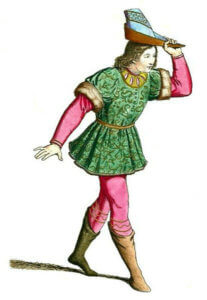
Curtis derives from the word “courteous,” but that surname has more than one origin. It also comes from “Curthose,” a nickname given to someone wearing short stockings.
By James Pylant
Copyright © 2006—All rights reserved
Do not post or publish without written permission
Same surname, different origin.
Of American surnames most frequently appearing in the Social Security Death Index, Curtis ranks at 267 of 50,000. Its derivation is often linked to the word courteous; a characteristic—as defined in the Middle Ages—of one with courtly manners, refinement or education. Two examples found by Charles W. E. Bardsley are Osbert le Curteys and Richard le Curteis, literally meaning “the courteous.”1 Curtis, however, has more than one origin. It also comes from Curthose, a nickname given to someone wearing short stockings. The Middle English word curt (meaning short) was coupled with hose, originally a man’s stockings. Perhaps the earliest reference to this nickname morphing into a last name is to Robert Curthose, the Duke of Normandy.2 Eventually the spelling of Curthose evolved into Curtis and the old spelling faded into oblivion.
Haynes‘s ranking of the 50,000 most common American surnames is at 297, while its variant Haines drops down the list at 1,043. Other spellings are Hanes and Heynes. There’s a multitude of possible origins for Haynes, Haines, Hanes, and Heynes. Hain is from the Middle English hegh (or its plural heghen), describing an enclosed area. Hain and Heyne are also personal names found in England before the arrival of the Normans. Individuals with one of these variants may descend from an ancestor from Hayne, in Devonshire, or Haynes, in Bedfordshire. Bedford’s Haynes was first recorded in the Domesday Book as Hagenes. The origin has differing theories and “none of them are very convincing,” say Patrick Hanks and Flavia Hodges.3 Hayn, Hayne, Haynes and Heynes also seem to have evolved from the Welsh personal name of Einws. Then there’s the possibility that your Hain, Haines, Hayne, or Haynes ancestor’s name signified a personality trait — wretchedness; the Middle English word for wretch being hain (sometimes spelled haine or heyne). Hanks and Hodges add other possibilities for Hain, including German and Jewish.4 In searching the roots of a Johansson family of Freyele, Jönköping, Sweden, we learned that they assumed the name of the family farm, Hane, as their surname in the 1800s.
The very British Hampshire, numbering at 15,917 on the frequency list, is not what it seems. The obvious genesis points to a forbearer from the English county with that name. But Hampshire is also an Americanization of the German Hambscher or Hamsher.
Presley is oftentimes a variant of the English Priestley. But many American Presleys are of German descent, their surname being an Americanization of Bresslar, which evolved into Presslar and eventually Pressley and Presley.
Some Americans with Merckle, Merckley or Markley ancestors can trace their lineage from Jörg Mercklin (1603-1686) of Bonfeld, Germany.5 Still others may find these or similar spellings in England. Sixteenth century christenings, as extracted in the International Genealogical Index, show Markle in Devon and Mercoll in Essex, while Markley is found in Bedford.
In England, Milson has three possibilities for its derivation. Did the family take their name from Milson Parish, in Shropshire? Or was an ancient ancestor known as Milson or Millson because he was the son of Miles or Millicent? Bardsley believed the Shropshire locale “had little influence” on Milson being assumed as a family name.6
Byland narrowly makes an appearance on the list of 50,000 most common American surnames; it ranks at 47,342. Despite rarity in America, it’s found in the British Isles, the Netherlands, and Scandinavia. English Bylands took their name from Old Byland Parish, in Yorkshire. Byland (Bylund) is also Swedish and Norwegian; by (meaning farm) and lund (meaning grove). Theodericus Doys De Bilant, a 13th Century nobleman, was the ancestor of the counts and barons Van Bylandt, in Holland. Theodericus van Doys, who coined De Bilant as his surname, was of Germanic background. Van Bilant and Van Byland were Dutch spelling variants of the surname. His descendants lived throughout Europe.7
Dibble and Dipple denotes descent from an ancestor with the Germanic name Dibald (originally Theobald). But Dipple could also indicate an ancestor dwelled near a—dark stream—as is the case when the lineage is unquestionably Scottish.
Thigpen, when English, refers to an inhabitant—at or near Thyga’s enclosure or hill—says Elsdon C. Smith. But when German, Thigpen was a nickname describing a beggar.8
Uncovering the background and meaning of a last name as it pertains to a particular family is challenging, if not impossible. But the study always intrigues, with speculation of a Florence family either taking their surname from the Italian city or simply because a medieval progenitor was simply known as Florence.
- Charles Wareing Endell Bardsley, English Surnames: Their Sources and Significations (London: Chatto and Windus, 1875), p. 540.
- The Duchess of Cleveland, The Battle Abbey Roll, With Some Account of the Norman Lineages (London: J. Murray, 1889), Vol. II, p. 75.
- Patrick Hanks and Flavia Hodges, A Dictionary of Surname (New York: Oxford University Press, 1989), p. 234.
- Ibid.
- Ralph Connor, Jost Hite From the Neckar to the Shenandoah (Chicago: June B. Barkeman, 1980), p. 2.
- Bardlsey, English Surnames: Their Sources and Significaitons, p. 534.
- Peylont: Journal of Piland/Pilant/Pyland/Pylant Family History, No. 3 (June 1991), p. 35.
- Elsdon C. Smith, American Surnames (Philadelphia: Chilton Book Company, 1969), p. 165.
